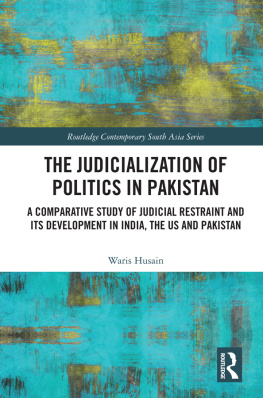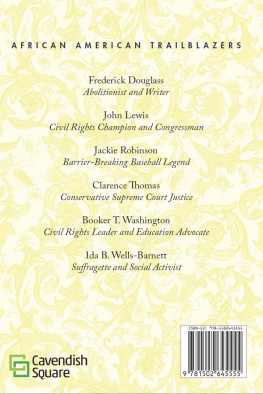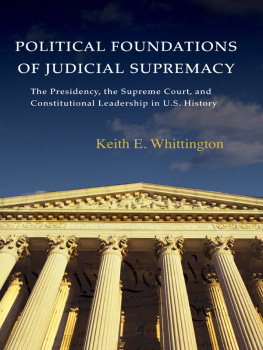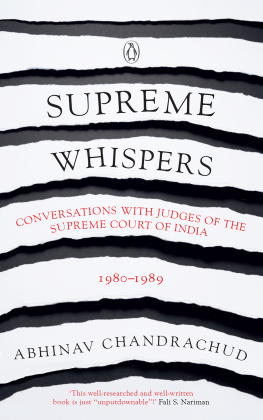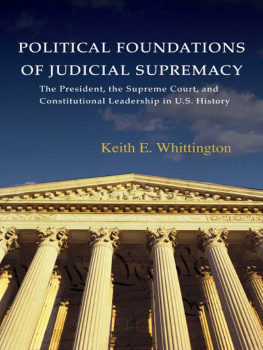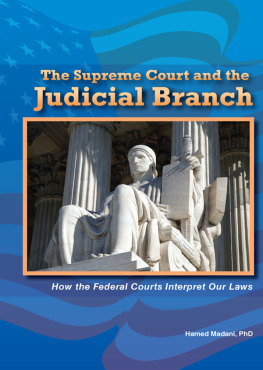Waris Husain - The Judicialization of Politics in Pakistan: A Comparative Study of Judicial Restraint and its Development in India, the US and Pakistan
Here you can read online Waris Husain - The Judicialization of Politics in Pakistan: A Comparative Study of Judicial Restraint and its Development in India, the US and Pakistan full text of the book (entire story) in english for free. Download pdf and epub, get meaning, cover and reviews about this ebook. year: 2018, publisher: Routledge, genre: Politics. Description of the work, (preface) as well as reviews are available. Best literature library LitArk.com created for fans of good reading and offers a wide selection of genres:
Romance novel
Science fiction
Adventure
Detective
Science
History
Home and family
Prose
Art
Politics
Computer
Non-fiction
Religion
Business
Children
Humor
Choose a favorite category and find really read worthwhile books. Enjoy immersion in the world of imagination, feel the emotions of the characters or learn something new for yourself, make an fascinating discovery.
- Book:The Judicialization of Politics in Pakistan: A Comparative Study of Judicial Restraint and its Development in India, the US and Pakistan
- Author:
- Publisher:Routledge
- Genre:
- Year:2018
- Rating:5 / 5
- Favourites:Add to favourites
- Your mark:
The Judicialization of Politics in Pakistan: A Comparative Study of Judicial Restraint and its Development in India, the US and Pakistan: summary, description and annotation
We offer to read an annotation, description, summary or preface (depends on what the author of the book "The Judicialization of Politics in Pakistan: A Comparative Study of Judicial Restraint and its Development in India, the US and Pakistan" wrote himself). If you haven't found the necessary information about the book — write in the comments, we will try to find it.
Since 2007, the Supreme Court of Pakistan has emerged as a dominant force in Pakistani politics through its hyper-active use of judicial review, or the power to overrule Parliaments laws and the Prime Ministers acts. This hyper-activism was on display during the Supreme Courts unilateral disqualification of Prime Minister Yousef Raza Gilani in 2012 under the leadership of Chief Justice Iftikhar Chaudhry. Despite the Supreme Courts practical adoption of restraint subsequent to the retirement of Chief Justice Chaudhry in 2013, the Court has once again disqualified a prime minister, Nawaz Sharif, due to allegations of corruption in 2017.
While many critics have focused on the substance of the Courts decisions in these cases, sufficient focus is not paid to the amorphous case-selection process of the Supreme Court of Pakistan. In order to compare the relatively unregulated process of case-selection in Pakistan to the more structured processes utilized by the Supreme Courts of the United States and India, this book aims to understand the historical roots of judicial review in each country dating back to the colonial era extending through the foundational period of each nation impacting present-day jurisprudence. As a first in its kind, this study comparatively examines these periods of history in order to contextualize a practical prescription to standardize the case-selection process in the Supreme Court of Pakistan in a way that retains the Courts overall power while limiting its involvement in purely political issues.
This publication offers a critical and comparative view of the Supreme Court of Pakistans recent involvement in political disputes due to the lack of a discerning case-selection system that has otherwise been adopted by the Supreme Courts of India and the United States to varying degrees. It will be of interest to academics in the fields of Asian Law, South Asian Politics and Law and Comparative Law.
Waris Husain: author's other books
Who wrote The Judicialization of Politics in Pakistan: A Comparative Study of Judicial Restraint and its Development in India, the US and Pakistan? Find out the surname, the name of the author of the book and a list of all author's works by series.

